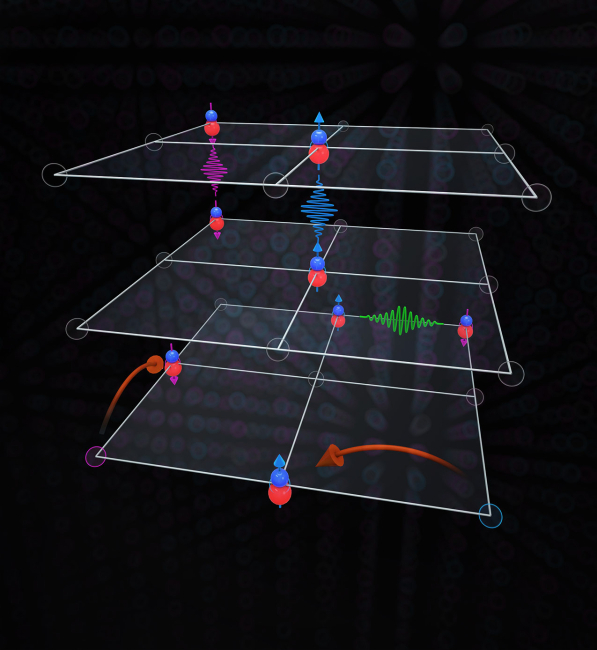Observation of Generalized t-J Spin Dynamics with Tunable Dipolar Interactions
| Author | |
|---|---|
| Abstract |
Long-range and anisotropic dipolar interactions profoundly modify the dynamics of particles hopping in a periodic lattice potential. Here, we report the realization of a generalized t-J model with dipolar interactions using a system of ultracold fermionic molecules with spin encoded in the two lowest rotational states. We systematically explore the role of dipolar Ising and spin-exchange couplings and the effect of motion on spin dynamics. The model parameters can be controlled independently, with dipolar couplings tuned by electric fields and motion regulated by optical lattices. |
| Year of Publication |
2025
|
| Date Published |
2025-04
|
| Journal Title |
Science
|
| Volume |
388
|
| Issue |
6745
|
| Start Page or Article ID |
381–386
|
|
Carroll_t-J spin_Science_2025.pdf962.51 KB
|
|
| DOI | |
| URL | |
| Download citation | |
| JILA PI | |
| Related JILA Highlights | |
| Associated Institutes | |
Journal Article
|
|
| JILA Topics | |
| Publication Status | |
| Publication Image |

|


 The Physics Frontiers Centers (PFC) program supports university-based centers and institutes where the collective efforts of a larger group of individuals can enable transformational advances in the most promising research areas. The program is designed to foster major breakthroughs at the intellectual frontiers of physics by providing needed resources such as combinations of talents, skills, disciplines, and/or specialized infrastructure, not usually available to individual investigators or small groups, in an environment in which the collective efforts of the larger group can be shown to be seminal to promoting significant progress in the science and the education of students. PFCs also include creative, substantive activities aimed at enhancing education, broadening participation of traditionally underrepresented groups, and outreach to the scientific community and general public.
The Physics Frontiers Centers (PFC) program supports university-based centers and institutes where the collective efforts of a larger group of individuals can enable transformational advances in the most promising research areas. The program is designed to foster major breakthroughs at the intellectual frontiers of physics by providing needed resources such as combinations of talents, skills, disciplines, and/or specialized infrastructure, not usually available to individual investigators or small groups, in an environment in which the collective efforts of the larger group can be shown to be seminal to promoting significant progress in the science and the education of students. PFCs also include creative, substantive activities aimed at enhancing education, broadening participation of traditionally underrepresented groups, and outreach to the scientific community and general public.